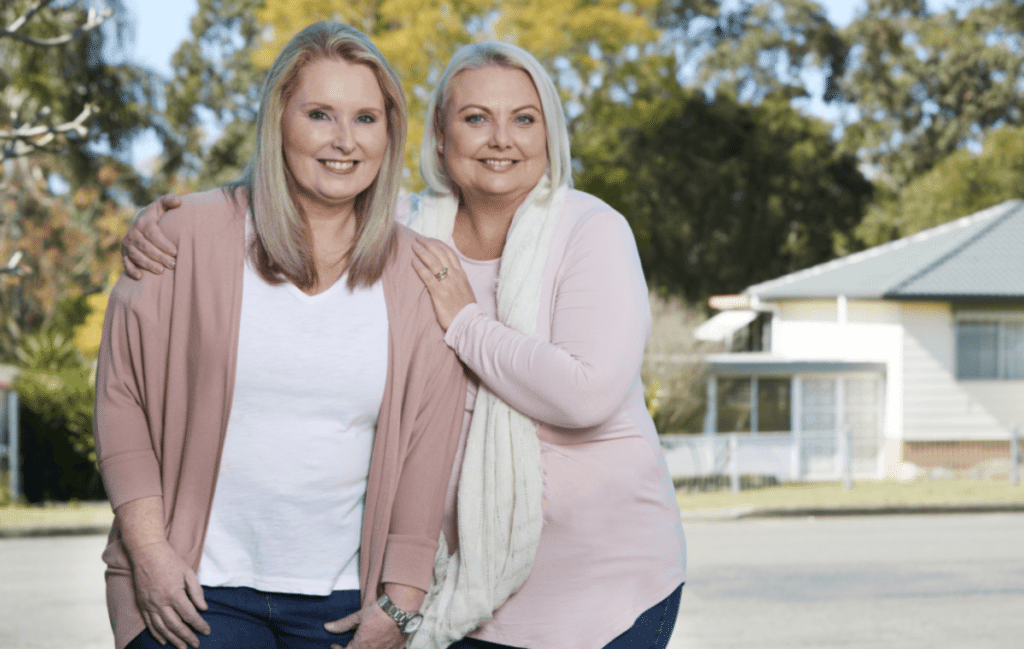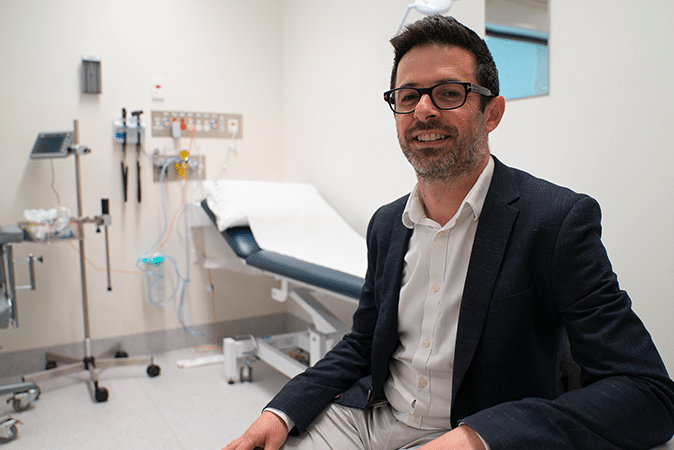Meet The Cousins Helping To Prevent Breast Cancer For Women With A BRCA1 Gene Mutation
Cousins Raelee and Lisa have the BRCA1 gene mutation.
It’s an inherited gene that significantly increases their chances of being diagnosed with breast cancer.
Their parents cousin had been diagnosed with breast cancer and discovered she carried the BRCA1 gene mutation. This led to Lisa’s and Raelee parents being tested and discovering they also carried the gene.
This was significant, as children of women and men with a confirmed BRCA1 gene mutation have a 50/50 chance of inheriting it.
Lisa said after other family members had tested positive to the genetic mutation, her dad was contacted and asked if he would like to undergo genetic testing.
“I think initially he wasn’t that interested in being tested,” Lisa said. “But once I explained to him that that’s how you find out whether you have the genetic mutation and then, if he was positive, we could find out whether I have the gene, that it was important to me. Then he was very keen to have the testing.”
After Lisa’s dad found out he had the genetic mutation, Raelee mother underwent testing. When it was confirmed she also had inherited the mutation, Raylee underwent her own genetic test.
Listen to the Podcast
Cousin’s Raelee and Lisa are the first Australian participants in the ground-breaking BRCA-P clinical trial.
What Is The BRCA1 Gene Mutation?
Both Raelee and Lisa were unawares of how the positive test would impact their lives.
“I thought it mainly meant breast cancer. I didn’t realise it also meant ovarian cancer, and I didn’t realise that it could possibly affect men as well,” said Raylee.
Everyone has BRCA1 and BRCA2 genes. The function of the BRCA genes is to repair DNA damage in a cell and keep breast, ovarian, and other cells growing normally. An inherited mutation in a BRCA1 or BRCA2 gene means that one of the copies of the gene is not working but that the other copy can maintain the normal function.
It is when the second copy of the BRCA1 or BRCA2 gene acquires a mutation that both copies are now non-functional, and the wrong protein is made.
With two non-functional copies making the wrong protein, the ability of the cell to repair DNA damage is affected. If DNA damage cannot be repaired, but the cell remains alive, the cell may become cancerous by growing uncontrollably and forming a tumour mass.
BRCA1 and BRCA2 gene mutations account for about 5-10% of breast cancer diagnoses in Australia today.
But the Breast Cancer Trials BRCA-P clinical trial hopes to change that.
Participating In The BRCA-P Clinical Trial
The BRCA-P clinical trial is a prevention trial which is testing the effectiveness of a drug called Denosumab in preventing breast cancer in women with a BRCA1 gene mutation, like Lisa and Raelee. This treatment has been fast-tracked from the lab to a stage three clinical trial due to its impressive pre-clinical results.
It is a welcome prevention alternative for Lisa and Raelee.
The cousins were seeing the same specialist for breast cancer screening and to discuss their options. She raised the BRCA-P trial with them both in a regular screening appointment and both women were immediately interested.
Their children were front of mind when they made their decision to participate.
“I said yes because my initial thought was how could this affect my family in the future? Could this possibly be a way for my kids to have a better outcome if they test positive to this gene mutation.”
Lisa agreed, sharing that the 50/50 chance of her children inheriting the gene mutation is why she wanted to participate.
“I think about it all the time.”
“What if they do have the gene and what if that means that they may develop breast cancer and what decisions are they going to make in the future? And how is that going to affect their life? It’s definitely a concern.”
Both women said despite not having a great understanding of clinical trials before-hand, they were confident in participating.
“My knowledge of clinical trials was from Grey’s Anatomy,” said Raelee.
However, her specialist explained the purpose and requirements of the trial to them so they could understand fully what they were agreeing to and give their informed consent.
“She explained how you needed to commit to the full programme, the five years.”
“They said, obviously things do change, and things come up, but you needed to be able to commit and follow it through so that they get true results.”
“They explained everything really well. They gave us lots of information. It’s very straightforward.”
The Benefits Of Participating In The BRCA-P Clinical Trial
The BRCA-P clinical trial is a randomised, double-blind, placebo-controlled study meaning that participants will be randomly allocated to receive either the trial drug or a placebo and neither the participant nor their doctor will know who is on the study drug and who is not. This is to ensure the trial results and reporting will be unaffected by any potential bias.
So Lisa and Raelee do not know if they are receiving the trial drug or placebo. But even If they are not receiving the trial drug, they have already seen benefits of participating.
The trial requires women to see their clinical trial team twice a year to receive an injection and undergo monitoring and screening.
“While we were already undergoing screening anyway with our specialist due to our BRCA status, but this is another added layer of screening. I can also bring up any questions or concerns in the appointments,” said Lisa.
“We’re getting an additional check every year with a specialist. So all of that is great. It’s all very positive and I think that if anything did happen to us, the clinical trial team would be on top of it right away.”
“I’ve just had my second appointment, and it was really quick,” said Raelee. “We went and had blood tests. I had a quick chat with the doctor, and I was given a second injection.”
Looking To The Future When You Have A BRCA1 Gene Mutation
Both women are participating in the BRCA-P clinical trial to ensure they have a future for themselves, and also for their family.
Both have children and have had to grapple with the fact that they may have passed down this genetic mutation to them.
Raelee said her daughter is now just beginning to come to terms with what it could mean for her.
“I was pretty open from the start with my kids. They were a little bit older than Lisa’s when I found out I had the mutation.”
“My daughter didn’t want to know anything at the time. She would say, ‘This is not happening. We’re not getting this. Go away. Don’t talk to me about it.’”
“But now she’s in her 20’s and she’s definitely more interested in finding out how to be proactive about it.”
Lisa’s children are younger, and don’t yet fully understand how this could affect them.
“I think about how I’m going to talk to them about it,” she said. “I think you have to be very careful in how you talk about it, because the decisions that they have to make can affect their life in a very big way.”
But both women are hopeful and positive that their participation in the BRCA-P clinical trial will bring real change to their children and many other women and men who carry the BRCA1 gene mutation.
“I hope that this trial is successful, and that if my kids do test positive eventually, they’ll have access to this treatment to hopefully break that chain off genetic mutation.”
How You Can Participate In The BRCA-P Clinical Trial
The BRCA-P clinical trial is a prevention clinical trial, therefore potential participants are those who have not had breast cancer but who carry the BRCA1 gene mutation and therefore are at higher risk.
Eligibility must be assessed carefully and includes the following criteria:
o Women who carry a BRCA1 gene mutation and are aged 25-55 years and unaffected by breast or ovarian cancer.
- May be either pre or post-menopausal.
- Not pregnant or planning to get pregnant.
- Have not had preventative breast surgery.
- Not taking any breast cancer preventative agents such as Tamoxifen or an Aromatase Inhibitor.
If you believe you are eligible and would like to participate in this very important research, your genetic counsellor or familiar cancer centre can provide a referral to a participating institution.
The BRCA-P clinical trial will be open by Breast Cancer Trials in 15 medical institutions throughout Australia.
You can sign up to receive updates on the trial, including when each site opens, here.
The trial will open at:
- The Olivia Newton John Cancer Wellness and Research Centre (Austin Hospital)
- Ballarat Oncology and Haematology Services
- Concord Repatriation General Hospital
- Lake Macquarie Private Hospital
- Monash Medical Centre (Clayton)
- Prince of Wales Hospital
- Royal Adelaide Hospital
- Royal Brisbane and Women’s Hospital
- Royal Hobart Hospital
- The Royal Melbourne Hospital
- Royal North Shore Hospital
- St John of God Hospital Subiaco
- St Vincent’s Hospital Sydney
- Westmead Hospital
- Wollongong Hospital
If you are unable to participate, but would still like to support this research, you can show your support by donating below.
QUICK ACCESS
Support Us
Help us to change lives through breast cancer clinical trials research



